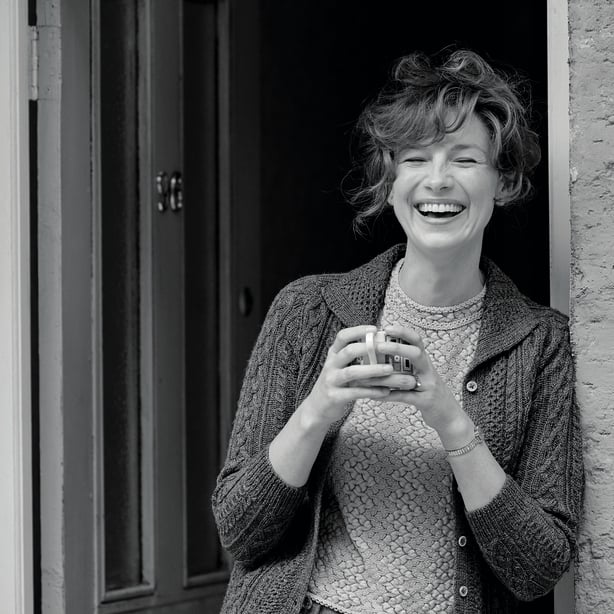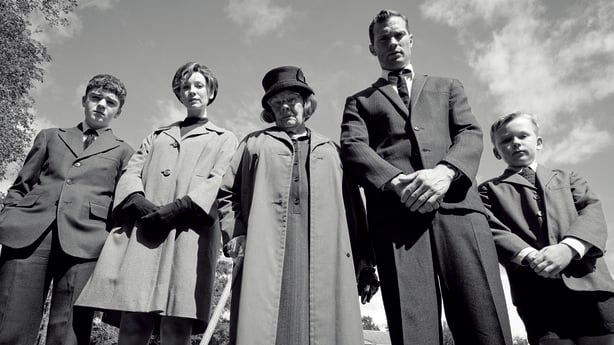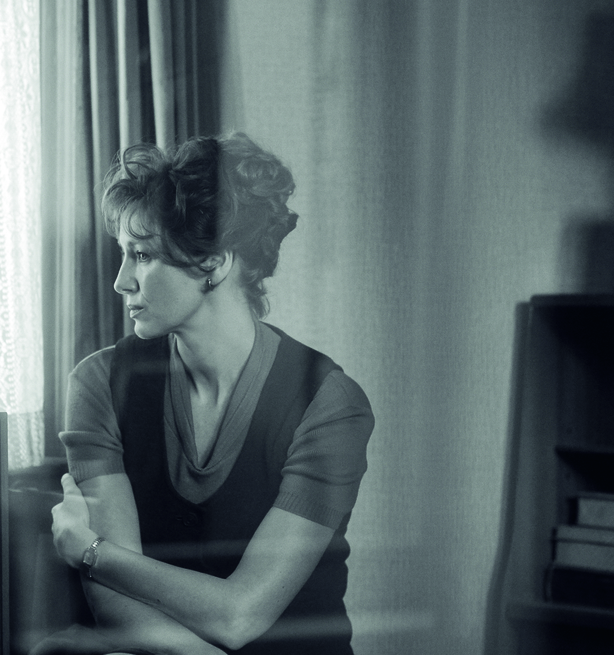Kenneth Branagh's autobiographical drama Belfast is among the must-see movies of 2022. Michael Doherty chats to one of its stars, Caitríona Balfe.
Though most famous for her award-winning role as time-travelling Sasanach Claire Randall in the hit TV series Outlander, Caitríona Balfe has also appeared in numerous movies over the years.
Her resumé includes Escape Plan (2013), Ford v Ferrari (2019) and Money Monster (2016), which co-starred George Clooney and Jodie Foster. But it’s her latest, Belfast, that has resulted in the former top model receiving the best notices of her movie career – not to mention a strong shot at a Best Supporting Actress nod when the Oscar nominations are announced on February 8.
In Kenneth Branagh’s powerful and moving drama, the actress – Dublin-born and Monaghan-raised – plays Ma, matriarch of a working-class Belfast family endeavouring to keep her family together at the onset of The Troubles.
We spoke to Caitríona about everything from babies to Belfast to bonding with Judi Dench…
Writer/director Kenneth Branagh has described Belfast as a tale that’s both heart-breaking and heart-warming: is that what drew you to the project?
Yes, because as an actor, you love to do both. That’s one of the things that struck me when I first read the script. You’re laughing, but there are also moments when you’re kind of cringing at the recognition of yourself, or your mother, and then you’re in tears by the end of it! You dream of being given a project that’s as good as that on the page, and when the director has also written it, you know it can only get better. So it was just a dream.

Belfast is such an evocative title and an evocative city which means so many different things to people of different generations on this island. What does it mean to you?
My sister went to university in Queens, so it was a city I’m familiar with and one I spent quite a bit of time in when I was much younger. But you know, I grew up on the border, so I’ve been looking to do a project that was set there, even though we didn’t end up filming in Ireland.
You often read projects that are steeped in the ideology of what went on in the conflict but that’s always been something I’ve tried to stay away from. I just feel that looking back with romanticism on those times is not really what I want to do. But I think what Ken did here was strip away all that ideology and look at it from a very human point of view, to show us that the love of family and community were things that were destroyed by this conflict.
And that to me is the most heart-breaking thing that has happened to our country and our nation: how it was just destroyed by these, you know, minuscule differences between us. It ruined so many lives, and so many lives were lost, for such a long time.
And the city itself?
Belfast is such a great city and I’ve been back recently a few times. Even before I knew I was doing the film, I was back right before lockdown. At that point, it was great to go there and see how it was rejuvenating, thanks to Game of Thrones among other things.
It was like, oh the city’s coming back to life and that’s great, because I remember being back there when my sister was in university, and it was always such a tense place. You always had to be careful about, you know, sounding too "Southern", or whether you were on the "right" streets or not. Even though this is Ken’s very personal story, I felt a connection myself to this script. You just can’t help but feel that if you’re Irish.
It must be daunting to portray a real character, Caitríona. But how much more daunting is it when you’re playing the mother of the man staring at you down the lens?
Ha ha ha! Ken, to his credit, never made it feel like we had to do his version. There’s a reason he is so great at what he does. I mean, he’s such an intelligent man and, I think very cleverly, he pulled the strings of what he wanted us to play without making it seem like that’s what he was doing!
On the first day where we all got together, he had Judi (Dench), Ciarán (Hinds), Jamie (Dornan) and I sit in a room with him, and he talked to us and asked us questions about our childhood and our own parents. On one hand, it felt like a little exercise for us to get to know each other; but I think it was also very much an exercise for him to pull out the specifics of what he wanted us to bring to our performance.
Like I say, he never made it feel like he wanted us to do his version: rather he wanted us to bring as much of our own selves to it as possible. Ken gave us a freedom to do that, and at the same time, you could always ask him questions and in that easy way he would tell us stories about his childhood, and you’d glean so much from that.
At the beginning, to be honest, I was absolutely bricking it! But once we started, it was an easy, organic shoot.

You’ve worked with some impressive ensemble casts in your time, but this seems like a particularly pinch-me ensemble to be working alongside…
Oh my God, yes! I still can’t quite get over the fact that I’ve worked with Judi Dench: that will never leave me. I remember seeing Ciarán in a play, probably about 15 years ago in New York. I’ve watched him in so many different projects and he’s just an amazing actor and the most darling man.
Funnily enough, Jamie and I met for the first time two years ago at the Toronto Film Festival. We were both there with projects and had a mutual friend who introduced us. Obviously, he’s an amazing actor and such a great guy. When my agent told me he was sending me over the script, and I knew who was involved, I was kind of like, I don’t even have to read this, I’m going to do it anyway!
You mentioned Toronto – Belfast got an amazing reception at last year’s festival during its world premiere screening. How gratifying was it to see a movie, that meant so much to the cast and crew, being so warmly received by an audience?
It was gratifying for everybody who worked on it. It happened at such a specific time. We had just come out of lockdown and before we went back into it, we had this magical seven weeks where the sun was always shining, and we all genuinely loved each other and got along so well.
When you do a project like this, you walk away with the most amazing, happy memories and you kind of think, well, even if this doesn’t go anywhere, that was a highlight of my life and my career. Because it’s such a specific story from Ireland and we’re such a small nation, you never know if it’s going to be relatable for other people, or are they going to get it. And then when they do, I mean, it just makes you feel proud. And I’m so happy for Ken because he put so much of himself into this.
How did you find the experience of shooting in black-and-white for the first time?
I’m a real fan of black-and-white films, so it just felt exciting. In the beginning, Ken sent us this small sizzle reel (a short video compilation) with some Pawel Pawlikowski movies, plus Cinema Paradiso and some other titles, to give us a sense of the feeling he was going for.
The worst thing you can ever do is start a film when you’re not quite sure of the tone, but we knew from the very beginning what tone Ken was going for. It was exciting because it was very different to anything I’ve ever done before. Haris [Zambarloukos] is the most incredible Director of Photography. Any time I got to see a bit of footage, it just looked beautiful.
Was it tricky having to film under Covid protocols?
Because of the constraints of Covid, we had two locations and we were really repurposing every quarter, every angle, every street. But there’s nothing more exciting creatively than having to push against barriers or boundaries. Every day, it felt that they were coming up with new and inventive ways of making things work. As an actor, it was just beautiful to watch Ken and the crew being super-excited about what they were doing.
Ma has a very striking look: stylish, but very much in keeping with the 1960s period. Was it a fun look to work on?
Yes, and when it came to my costumes, we talked a lot about textures. For example, if Ma is wearing a plain turtleneck, does it have a little bit of a rib, or something? That was all very interesting. When it came to hair and make-up, Wakana [Yoshihara] is just amazing. She made everybody looked incredible.
I think her biggest disappointment was that the colour of my wig was so spectacular, and she was like, "Nobody’s going to see it!" But again, when you’re shooting in black-and-white, everyone must adjust what they’re doing to provide texture rather than colour.

In terms of the future, Caitríona, obviously there’s the next season of Outlander. But you also recently took on the role of a real-life Ma, when you and your husband (Anthony) welcomed your baby boy in October – congratulations. Add in the global release of Belfast and ensuing Oscar buzz and we’re talking busy times!
For sure! Being a new mum, I’m realising that my life is no longer my own! But you know, I think that’s something that, at this point in my life, I’m very ready for. I also feel really privileged to be working in a time where you get to do both film and TV and there’s no snobbery either way. TV has been very good to me, and I’ve been lucky that, while I haven’t done a lot of films, I’ve been able to do some special projects.
I don’t think you should live to work; you should work to live. And to put something into a performance, you must have a life, and you have to experience what’s going on, and I’m never one who likes to work back-to-back-to-back anyway. I always like to take a bit of time, to strip one character from yourself and find something else to put into a new one, so we’ll see.
The beauty of doing a movie like Belfast is that it opens more doors, so behind one of them I hope is another nice project. I also get to go back to Outlander next year. So I think, now, life is looking pretty good!


